Breadwinners
In a patriarchal society where men can expect to control their wives' career choices and have a final say over all household matters, a woman may go out into the world, find a job as a housekeeper, earn money, and support her whole family. However, her power and status at home may not change at all, so she ends up carrying the burden, rather than the privilege of being the sole provider.
Being a woman, documentary photographer, and having been directly impacted by these patriarchal structures, I was drawn towards capturing the strong, intelligent women who are burdened with the financial responsibilities of providing for their families while enduring the societal pressure of expected gender norms.
Breadwinners is shedding light on female housekeepers who are overlooked and relegated to the fringes of Egyptian society. It is also a series of investigation into the impact of Egyptian culture and patriarchal norms on these women's lives.
Female housekeepers in Cairo often take on the role of a surrogate mother at their place of employment, sometimes living in the same house, cooking, cleaning, ironing, and caring for the children in the house. It is not unusual for a domestic worker to be seen as part of the family, even though their duties are in many ways more akin to those of a servant.
More pressing is their treatment under the Unified Labour Law in Egypt. These female domestic workers are not provided with any sort of legal protection. In fact, legislators had actively sought to deprive them of legal protection because they do not understand how to compare a domestic worker to a regular one - their work is not seen as real or worthy of labour protection laws.
The sheer amount of effort and time required of them to do all this work, and yet not be given any appreciation, legal support, or respect deeply resonated with me, and I hope that this project prompts viewers and sparks a conversation around these dignified women and the valuable work they do in their communities.
2019

Amal, Arabic for "hope," is a 43-year-old mother of one. Cooking, cleaning, and maintaining the same two-bed apartment was the lifetime job she inherited from her mother. She is now part of two generations working with the same family. Traumatised by the abusive pedagogical methods utilised by her teachers, Amal dropped out of school at age 14. Housekeeping was not her career of choice She only resorted to taking on the job after her mother passed away, compromising her family's financial situation.
“I dropped out after middle school because the teachers used to beat us and I was traumatised by this experience”
Soon afterwards, in her mid-30s, she got married, only to divorce after three years to protect her son from an alcoholic, drug addicted, and physically abusive father.
“My ex husband used to drink and smoke up in-front of our son. When he started getting physically aggressive, I stood up to him and got a divorce”
Amal moved on to marry another man, 20 years her senior, who never married before. Kind as he is to her and her son, he is unable to have children and needs an expensive operation that his pension and Amal's income combined can’t cover.
Toxic masculinity has been following Amal all along, with painful situations like her sister being forced to break her hymen in front of a husband who was not interested in women but only wanted to save his pride.
“My mother possibly died from grief over societal shame and what happened to my sister”

“I have been working as a domestic worker for 25 years and it’s a very laborious job and I am worried I have no pension or medical insurance to lean on when my health deteriorates ”
-Azziza
-Azziza
Azziza, ”precious” in Arabic, is 50 years old and has been a housekeeper for all of her adult life, working with the same family for 25 years. She got married and gave birth to three children, and took custody of another two from her second marriage. Her first husband died from kidney failure. The second and third husbands divorced her after they realised she hadn’t inherited any money from her first husband. The second husband wanted her to buy him a taxi with her presumed inherited money, and the third wanted her to support him financially.
Azziza is illiterate. She found herself naturally gravitating toward the unregulated profession of housekeeping. She completes tasks such as cleaning, cooking, and managing the house's grocery inventory, none of which depend on reading or writing. This line of work does not offer a minimum wage, pension scheme, or any kind of recognisable employment rights. It’s an unregulated profession, where brokers link households with domestic workers, take an initial fee, and leave the workers to labour for daily pay with no hope, no long-term protection plans or medical insurance.
“Throughout my life, I witness and experience situations that make me feel sorry for myself. We have no rights or benefits whatsoever”
Azziza spends 15 hours each day commuting and working. With one-third of her daily pay disappearing in transportation to and from work, minimal time is left to take care of her children and herself.
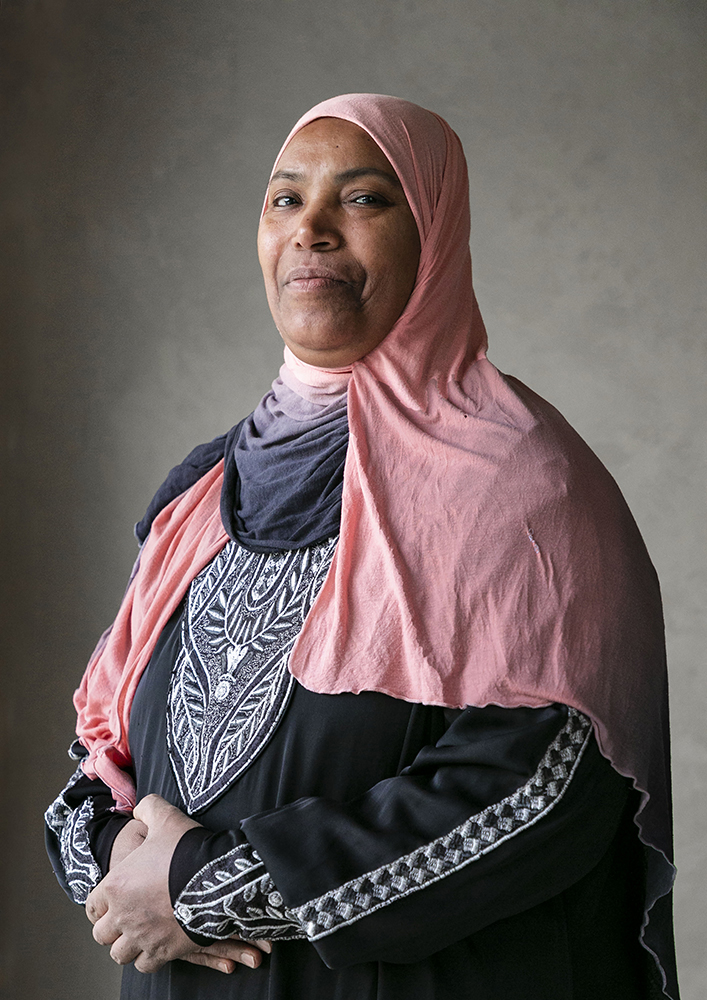
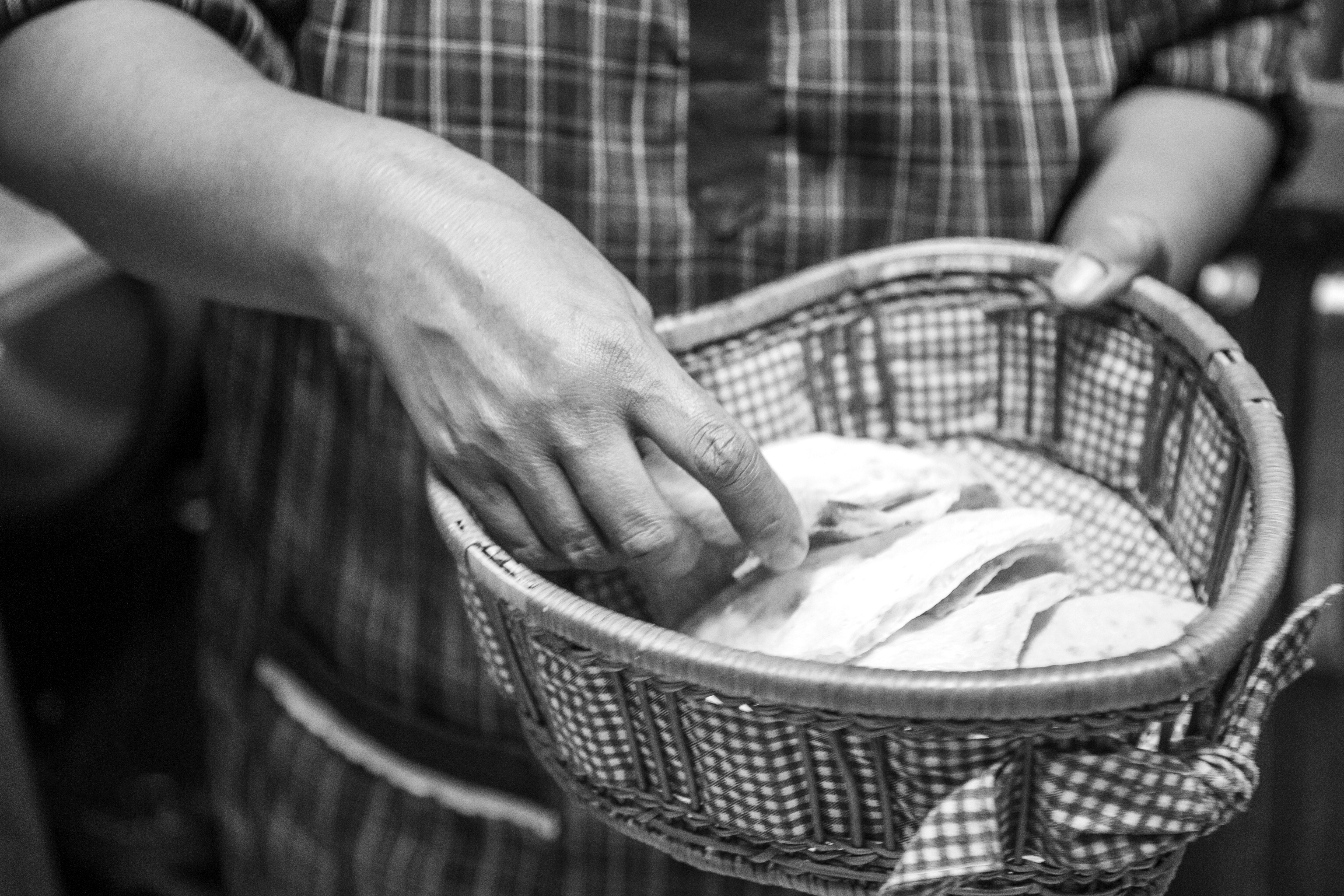

Wafaa, Arabic for "loyalty," is a 55-year-old mother of three daughters and one son. She married at the very young age of 17 and divorced early in her life. She has been working with the same employer for 11 years, commutes to and from work via microbuses and tok-toks, a round trip that takes at least three hours of her day.
“I got married when I was 17. Although my ex husband used to generate income, his behaviour was abnormal, he used to keep his income only for himself”
During her married years, she used to work and handle the family's financial obligations, while her husband reaped the rewards of her work. She cleaned other people's houses for a living and got paid daily for her services.
“One day after school he took my daughter to live with him and manipulated her and sent her to do domestic work and reaped the rewards of her daily labor. Now she’s back living with me”
Wafaa divorced her husband, a man who was more of a burden than a partner in life and suffered the consequences of crossing this unjust man. He forcefully took away their youngest daughter to Alexandria so she would cook and clean for him and also work and spend on the house. He made the daughter drop out of school, diverting her life path to one of manual labor rather than education and enlightenment. He falsely promised to support her to get married and pay for her trousseaus, but did not follow through on his promises. The daughter is 22 and has recently left her father to live with Wafaa in Cairo. She now works in a sewing factory and does not answer to her father nor pay him the rewards of her daily labor.
Noha, Arabic for "knowledge," is a 40-year-old mother of two teenagers and has been working as a proud cook and housekeeper for her employer for over 11 years. However, this was not the career she imagined for herself.
At a young age, Noha was forced by her father to drop out of school and get married. She did manage to secure a diploma in business before being forced to stop her educational journey. This is a common cultural phenomenon in specific segments of Egyptian society, where parents value their daughter being married and obeying a husband more than her getting an education, the chance at a career or even having the basic right to make her own choices.
After years of looking after her husband's ageing mother, Noha decided that she needed to start working in order to support her family financially and fulfil her ambitions. Initially, she applied for the position of a cook in a small hotel, however, eventually Noha ended up working in the hotel owner’s house as a cook and housekeeper.
“At first I was ashamed of sharing with my husband & people that I am a domestic worker and cook, because I felt it’s not a suitable job, but now I feel very proud of myself”
At first, this was a position she wasn't proud of and had to hide from her husband, even though he was sick and had stopped working, making her the sole breadwinner.
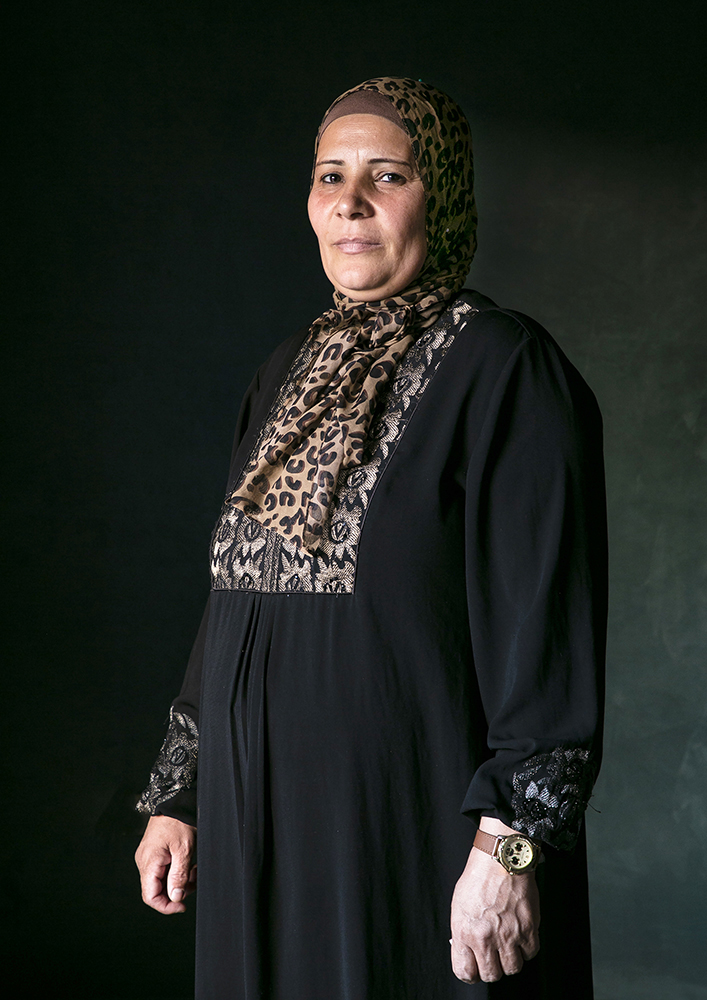
“I really wanted to continue studying post high school but my father and husband objected”
Noha

“I feel under immense pressure to fulfil my duties as a daughter, wife, mother, and sister. I am doing the best I can to financially support all of them”
Aida, Arabic for “returner," is a 41-year-old mother of two and a grandmother of one. She is also the sole caregiver to her mother, a 75-year-old woman struggling to navigate a chaotic healthcare system while dealing with numerous health issues. Aida has been working all of her adult life as a housekeeper, a path similar to the one taken by her own mother.
Aida is married to a 60-year-old-man, a smoker with a chronic heart condition and two pacemakers to keep him functioning. She is the sole breadwinner in the household. Her life has become an endless series of temp jobs to make ends meet and constant battles with the Egyptian healthcare system.
She takes days and weeks off from her work, which is lost income, to escort and support her mother through hospital visits. She always starts with the public health care system that turns patients away and does not have an adequate standard or the resources to deal with the demand, a system so flawed that people die in the queue from primary diseases. As a result, Aida is frequently forced to turn to expensive private clinics in the hope of securing the care required for her mother.
“When I took my mother to the hospital, I saw things I had never seen before. People queuing for days wrapped in blankets on the floor. This forced me to resort to private clinics that are beyond my budget”
“I got married at the age of 18. My husband socially isolated me from everyone. He is mentally unstable and he is like one of my children. I find this distressful. He doesn’t last 3 days in a job. I want to help him get treatment”
Azza
Azza, Arabic for "pride," is a 41-year-old mother of three children. She got married when she was 18 years old to a man with mental health issues who was unable to keep a steady job. This meant that from the get-go she took on many of the responsibilities related to providing for the family, including being the sole breadwinner.
She got into the domestic work profession and started working every day in other people's houses in order to feed her own family. Her husband was a drug addict and is now recovering, but he is still a conspiracy theorist and a mentally unstable man. He prefers to keep his family in isolation from society and does not enable Azza to have a social life nor does he support her in domestic chores, yet Azza feels sorry for him and treats him as another child in the house, even buying him cigarettes to indulge his bad habits.
“I devoted my life to try to provide for them and secure them but I was unlucky and I drowned in dept”
Al Gharemat, Arabic for women in prison due to their inability to pay back petty debts, is a chronic social problem in Egypt that many women like Azza find themselves in. In order to finance her daughter's wedding and the myriad costs of maintaining a household, she got into a petty debt situation. She is not yet in prison but lives her life in fear of ending up there if she stops being able to generate income through the frail profession of domestic work.
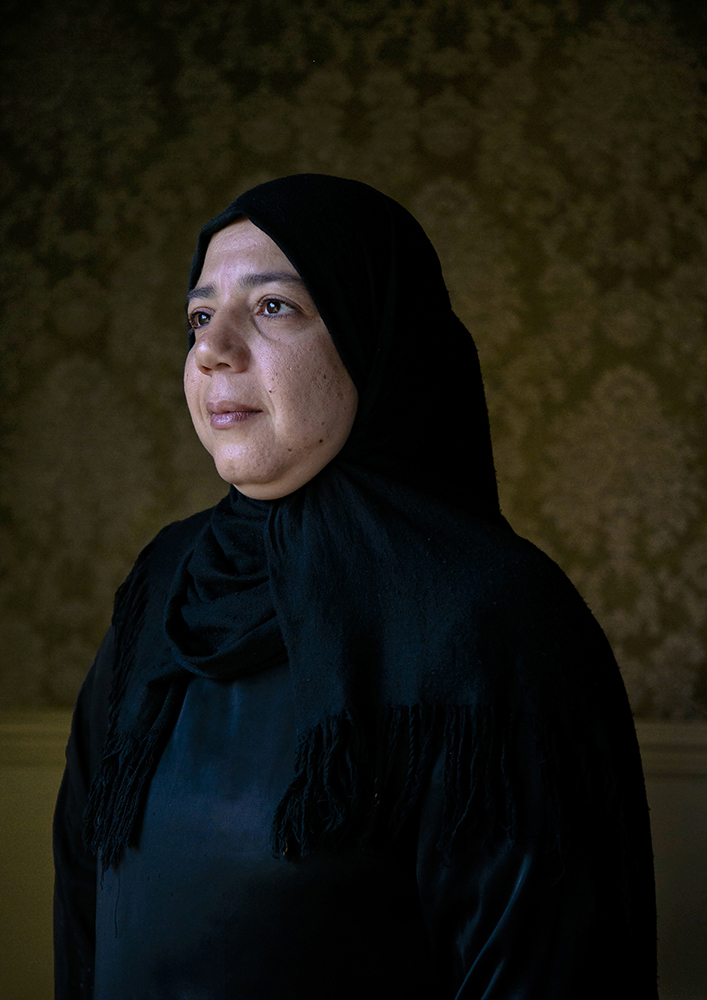
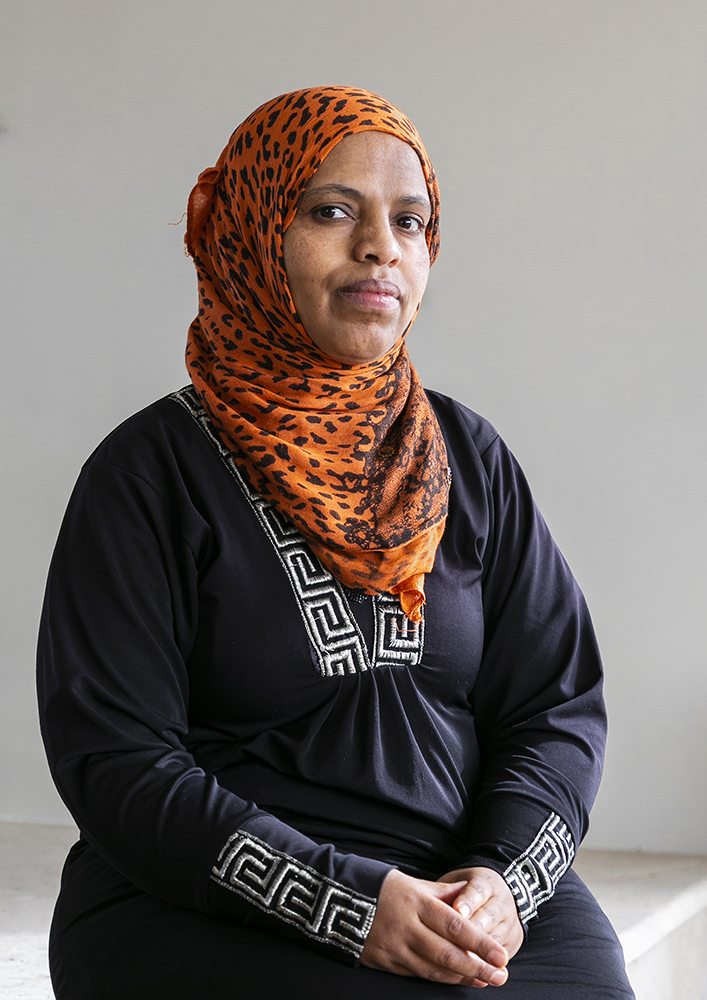

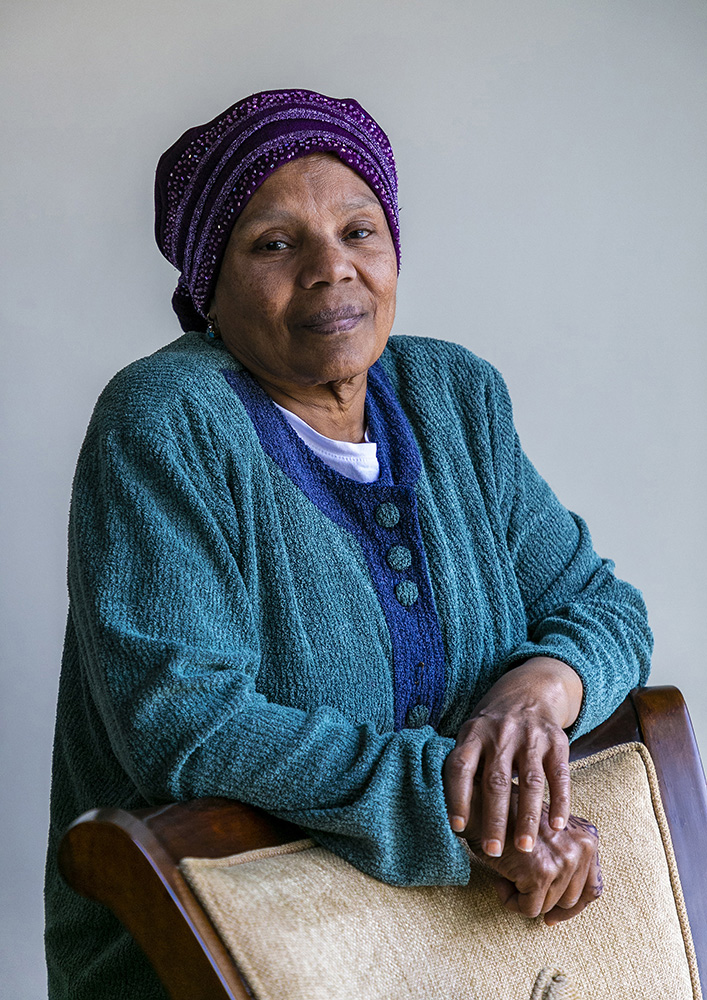
Saadeya, Arabic for "happy," is a 60-year-old housekeeper from Alexandria. Her two brothers and two sisters are still living there. She has a flat in her hometown but lives with her current employer whom she has been working with for 16 years in Cairo. Saadeya previously worked as a nanny for a Lebanese ambassador for ten years, which allowed her to travel to the US and several other countries.
She’s been married twice, but every time she got married her husbands wanted to take advantage of her and gain control over her income.
Enaiat, Arabic for "grace," is a 37-year-old mother of two. She is one of 10 siblings and the last daughter to get married. Enaiat's husband works as a driver but cannot sustain a sufficient income to send their children to school, so she works as a housekeeper to plug the income gap.
“I was coerced into an arranged marriage. I felt that I didn’t have a choice. My older sister is a bit aggressive and she pushed me. I felt like cattle being presented to a trader”
She was forced to interact with strange men whom her family would invite over to their house in an attempt to get her married. She did eventually get married, even though her mother-in-law to be was against her dark skin tone.another cultural stigma that prizes fairer skinned girls above all others.
“My mother in law didn’t like me and told my husband to find someone else because I have a dark skin tone. She also has a dark skin tone herself”
Enaiat endured her early marriage years living in the same household as her mother-in-law where she, amongst the other daughters-in-law, had to clean and cook for her whole husband's family. She was also forced to endure harassment and inappropriate behaviour from her husband's older brother.
Arranged marriages for young girls are common cultural themes in certain socioconomic classes and in thee countryside, and one of the leading causes of divorces and domestic abuse of women.
“I was coerced into an arranged marriage. I felt that I didn’t have a choice. My older sister is a bit aggressive and she pushed me. I felt like cattle being presented to a trader”
She was forced to interact with strange men whom her family would invite over to their house in an attempt to get her married. She did eventually get married, even though her mother-in-law to be was against her dark skin tone.another cultural stigma that prizes fairer skinned girls above all others.
“My mother in law didn’t like me and told my husband to find someone else because I have a dark skin tone. She also has a dark skin tone herself”
Enaiat endured her early marriage years living in the same household as her mother-in-law where she, amongst the other daughters-in-law, had to clean and cook for her whole husband's family. She was also forced to endure harassment and inappropriate behaviour from her husband's older brother.
Arranged marriages for young girls are common cultural themes in certain socioconomic classes and in thee countryside, and one of the leading causes of divorces and domestic abuse of women.
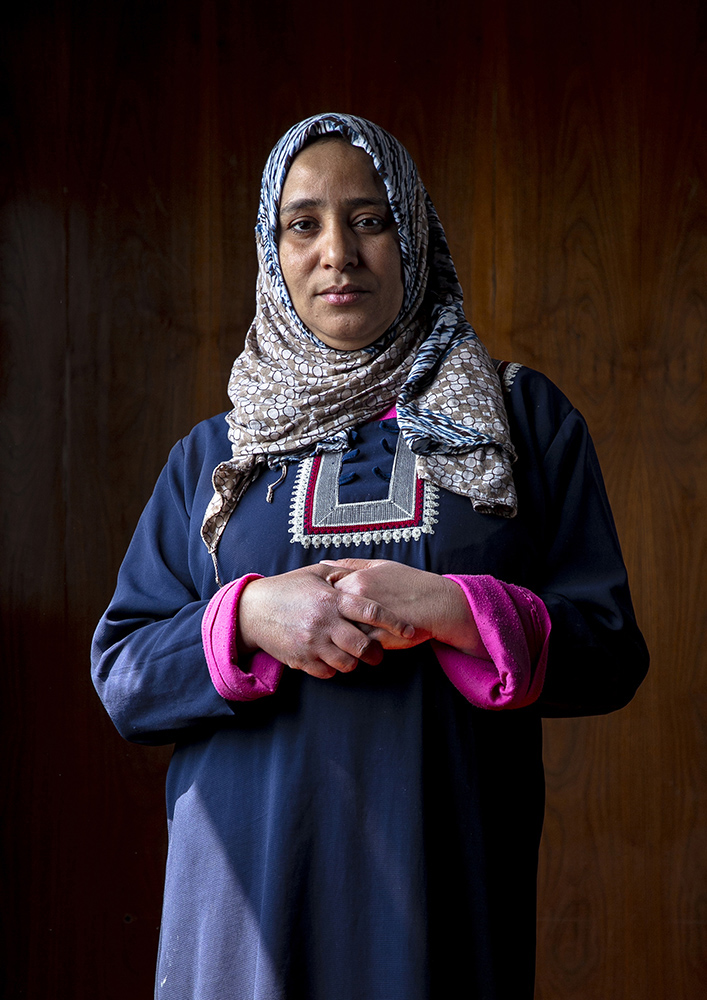


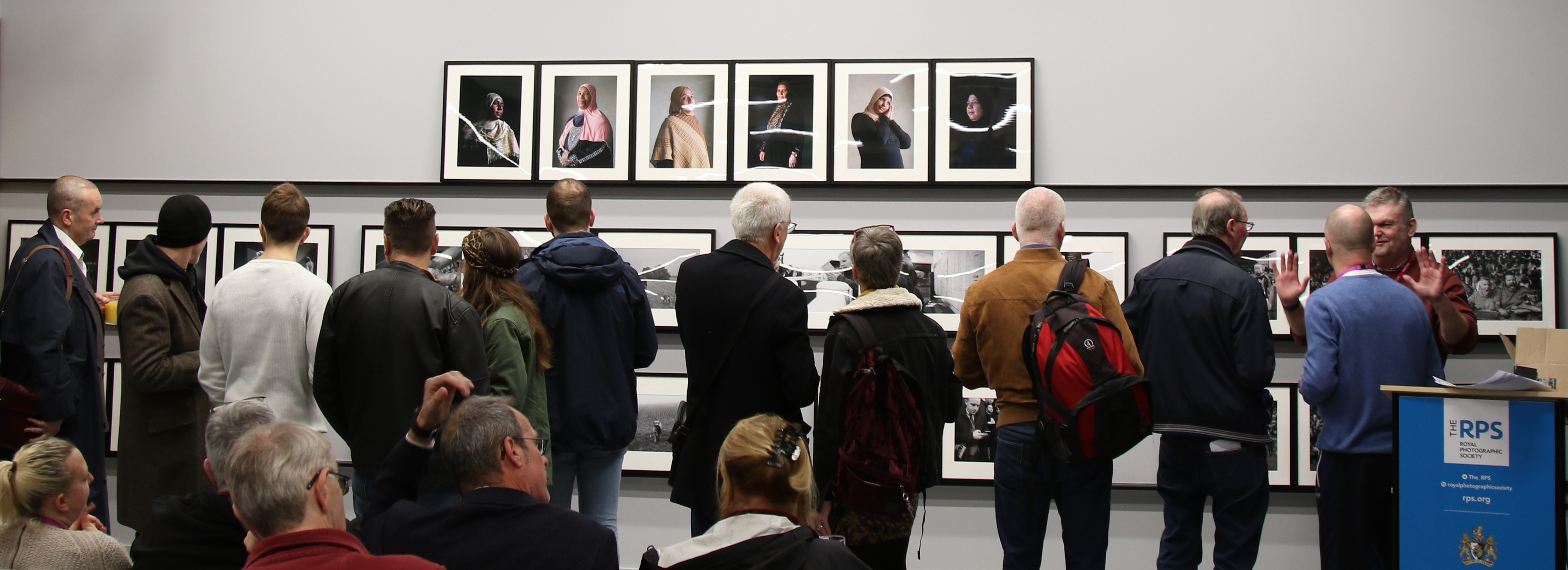
RPS Documentary Photographer Of The Year 2019 Install View